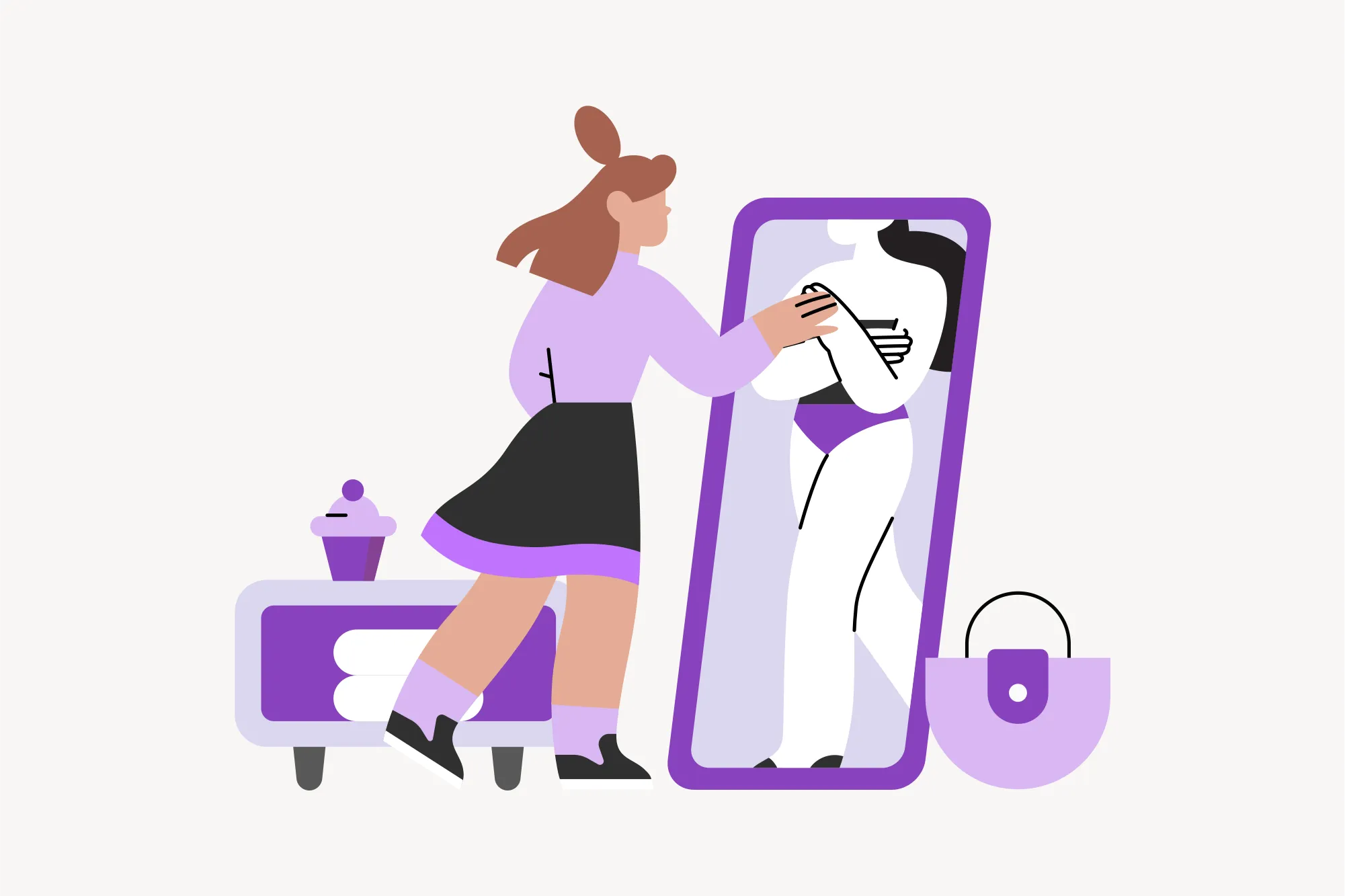Preparation strategies: What to do before you go
You can do many things before you go on your trip to set you up for success. Thinking ahead and preparing for food- and exercise-related challenges can help reduce anxiety while traveling.
1. Pack clothes you feel comfortable and confident wearing
Make sure you pack clothes you feel comfortable in or are familiar with. If wearing new clothes is a potential trigger for you, bring familiar clothes to minimize situations that might bring about old eating disorder behaviors. While you’re at it, leave any other triggering items at home.
2. Plan your meals ahead of time
Traveling can be unpredictable, but one thing you can do to mitigate anxiety and stress is to plan your meals and snacks ahead of time, especially if you anticipate long days.
Before you leave for your vacation, write down a meal and snack schedule, but leave room for flexibility. If you know you’ll have a busier schedule one day, plan to have snacks and drinks like Gatorade with you in case a meal will be later than you predicted.
Overall, it’s important to make sure you’re still set up to meet your meal plan and fluid intake. If you are having trouble creating a meal plan that works with your schedule, contact your dietician for assistance.
3. Browse local restaurant menus
Whether you’ll be staying in one place or traveling between various cities and towns, you’ll want to familiarize yourself with local restaurants, grocery options, and menus.
You can even plan out restaurants you’d like to dine at while you’re traveling and think about what meals the restaurants have. Remind yourself that recovery for some people can mean being flexible and not planning everything out as long as you meet your recovery intake goals.
4. Travel with a trusted loved one, if possible
Traveling with another person may be unavoidable at times, such as in the event of a work trip or traveling to see a sick relative; however, if it’s possible and supports your recovery, take a travel buddy with you. This can help curb anxiety and help you stay on track with your eating disorder recovery.
This doesn’t mean that you should travel with just anyone—make sure you choose someone you trust, someone who knows that you’re in recovery from an eating disorder and can support you through emotional challenges.
You don’t have to disclose anything you aren’t comfortable sharing, but having a nonjudgmental and compassionate person with you can do wonders for your experience.
5. Create a list of coping skills for on-the-road
If the trip is planned far enough ahead, consider writing down any potential difficulties you may have while traveling and any disordered thought patterns or behaviors that may arise.
List effective coping skills you can use to manage your emotions and triggers while traveling. Some of these coping skills may include a distraction, so pack preferred distractions, such as a coloring book or headphones for music.
You can also list other ways you may deal with these challenges, such as asking your travel buddy for support or calling a support person from home, like a therapist or friend from treatment.
Traveling strategies: Tips to follow during your trip
Being prepared is important, but handling situations in real-time on the road requires a different mindset and approach.
Remember that trips can be unpredictable, but even if things go off-course, you’ll have some coping strategies to help you.
1. Plan out your day
While free time on vacation can be an excellent chance to explore new things, it’s important to acknowledge how a lack of structure can sometimes be triggering for some individuals in recovery. This doesn’t mean you can’t allow yourself to be spontaneous, but you should start your day with a loose plan so you know what to expect.
This plan may include scheduled breakfast, either at your hotel or Airbnb or a local spot you’ve already scoped out, as well as any healthy habits you typically engage in at home. For example, if you start your day with a 15-minute meditation, continue that practice while traveling. It will create a sense of normalcy and structure. Then, you will want to schedule snacks and other meals for your activities.
If you know you have a history of skipping dinner, make a restaurant reservation with your friend so they can hold you accountable. The point is no one knows you better than you do, so adapt your plan based on what your particular struggles or challenges may be.
2. Carry water and snacks with you
If you are going on an excursion or all-day adventure, it’s extremely important to carry extra snacks and water to stay hydrated and satiated. Being away from accessible food or water isn’t an excuse to restrict your calories, but you may find yourself slipping into that behavior without packing what you need. It may also be helpful to choose snacks that you enjoy and are familiar to you so that you are more likely to eat them on the go.
3. Listen to your hunger and satiety cues
Eating regularly at home may be easier, especially once you’ve established structure and a routine. However, traveling can prove a bit tricky, especially when it comes to changing time zones and jet lag.
Traveling can take a toll on our bodies, circadian rhythm, and hunger and satiety cues. You may feel hungry at “weird” times, such as in the middle of the night. You must eat when you feel hungry, regardless of what time the clock says. After all, there are no normal and abnormal times to eat—it’s best to eat when your body is telling you it needs food.
To help you adjust to a new time zone, create a schedule where you eat within one or two hours of waking and alternate between snacks and meals every three or four hours after that. Use your internal hunger and satiety cues to guide whether you choose a light snack or a larger meal.
4. Do regular check-ins with yourself
If you are the type who is always on the go during vacation, you need to take the time to slow down and check in with yourself. If you are traveling with a loved one, ask them if they’ll do a check-in with you. You can talk about whatever you think will help, including your feelings, challenges, successes, and how to stay on track.
5. Avoid gyms or opportunities for vigorous exercise
While you’re on vacation, resist the urge to seek out individual opportunities to exercise, especially if compulsive exercise is one of your eating disorder behaviors. If you struggle with compulsive exercise, this may be a difficult tip to follow, but it’s essential not to fall back into old patterns in a new environment.
Plus, many trips may naturally involve additional physical activity, whether walking on the beach, swimming in the ocean, or hiking to see a national park's beauty. Avoiding intentional exercise is a healthy way to challenge your eating disorder and maximize your vacation.
6. Use your coping strategies in times of stress
Writing down your coping skills to prepare for your trip allows you to utilize them during stressful or upsetting times. Make sure to dip into your toolbox if you’re experiencing urges related to disordered eating. It can also be helpful to talk about how you feel to take the power away from your urges or desires.
7. Forgive yourself if you slip up
Remember, the nature of eating disorder recovery doesn’t change just because you’re on the road—recovery is still a lifelong process, with some f ups and downs expected. If you have a “slip up” while traveling, that’s okay. It doesn’t mean that you’ve failed. It means you need to be compassionate toward yourself but keep on the path to recovery. Reject a perfectionist attitude in favor of forgiveness and care.



























